
Nov 20, 2022 | The Blog
 I recently came across a lively Ukrainian pop song that sounded silly and innocent, a bit like the singer—a leggy blonde waif who looks like a Slavic Barbie doll.
I recently came across a lively Ukrainian pop song that sounded silly and innocent, a bit like the singer—a leggy blonde waif who looks like a Slavic Barbie doll.
Her name is Masha Kondratenko and her song is called Vanka-Vstanka.
The Vanka-Vstanka is a Russian egg-shaped wooden toy which is impossible to knock over because it’s weighted. It will wobble but never fall down. In the US it’s called a Weeble, but similar old-fashioned toys exist under different names in many other countries. The Russian name means Get Up, Ivan (Vanka).
But enough of the innocent connotations. When you translate the lyrics, you realize that it’s a song about the war in Ukraine and Vanka is a generic name for the Russian invader. All in all, the words strike a pretty chilling contrast with the upbeat rhythm and Masha’s bright blue eyes. They’re a death sentence passed on the Russian soldiers sent to their slaughter by a crazed dictator.
Vanka-Vstanka
You said you didn’t know
Oh how did it happen, how did it happen?
You were wandering in the woods
Where to go, how come?
Oh, we see your tears
You’re so scared, the whole woods are shaking!
Even the old woman from the market
said that you should all be burned!
Vanka, get up, what’s wrong?
Get your body bag ready!
Vanka, don’t run!
There’s nowhere to go!
Vanka, get up, what’s wrong?
Get your body bag ready!
Vanka, get up, don’t run!
There’s nowhere to go!
No one can hide,
Unless it’s a joke.
A Cossack is coming across the sea,
It’s a bad omen for you!
One, two, three, four, five,
You have nowhere to run!
One, two, three, four, five,
Our Cossack is coming to find you!
Vanka, get up, what’s wrong?
Get your body bag ready!
Vanka, get up, don’t run!
There’s nowhere to go!
Vanka, get up, what’s wrong?
Get your body bag ready!
Vanka, get up, don’t run!
There’s nowhere to go!
Vanka, get up, what’s wrong?
Get your body bag ready!
Vanka, get up, don’t run!
There’s nowhere to go!
Vanka, get up, what’s wrong?
Get your body bag ready!
Vanka, get up, don’t run!
There’s nowhere to go!
It’s such a catchy tune that I’m sure even the Russian invaders will find themselves whistling it while they wander aimlessly through the woods. But there’s nowhere to go, Ivan.
Could this song become the Lili Marleen of the 2020’s?
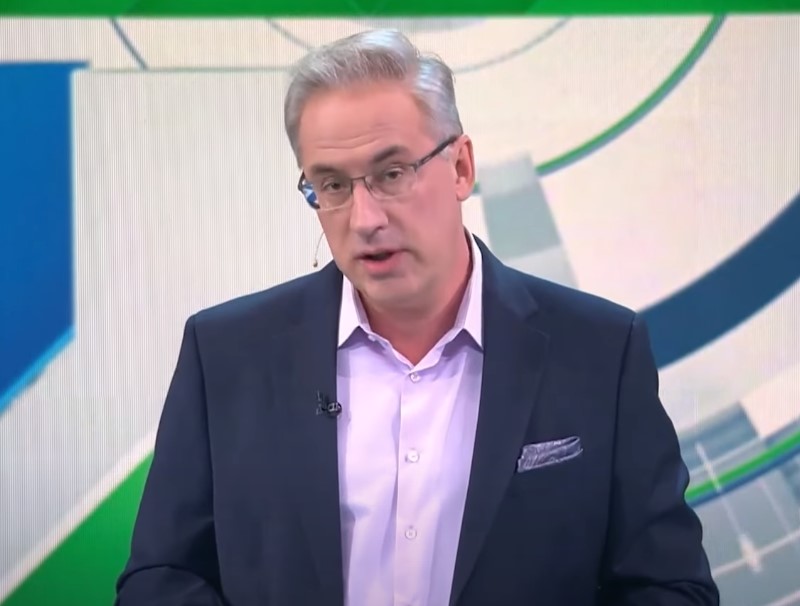
Nov 12, 2022 | The Blog

Andrey Norkin
Molti ricorderanno il vecchio classico di Joseph Heller “Catch 22” (in Italia “Comma 22”).
Il problema del titolo italiano è che comma non traduce affatto il significato di “catch”, cioè paradosso, tranello (che invece è l’essenza del libro.)
Fast-Forward dal 1961 al 2022.
La Russia, che ha invaso l’Ucraina il 24 Febbraio con alterne vicende, decide a Novembre di evacuare le sue truppe da Kherson, capoluogo dell’omonima Oblast, creando panico e sgomento tra i telepropagandisti al soldo del Cremlino che da tempo sbraitano invocando misure militari draconiane che farebbero impallidire un feldmaresciallo dell’esercito nazista.
In questo squallido panorama dell’informazione di regime in Russia, ha brillato per pochi secondi il sottile umorismo di un certo Andrey Norkin, conduttore del programma Mesto Vstreci del canale di stato NTV e propagandista allineato (finora) con il regime.
Ecco in breve il Catch 22 creato dal Cremlino e spiegato da Norkin (libera traduzione dello scrivente).
“Abbiamo appreso dal Ministero della Difesa la decisione di ritirarsi sulla riva sinistra del Dnipro.
Non chiedetemi che cosa ne penso, non ve lo dirò.
Vi posso però dire perché non lo farò.
Se dico di essere d’accordo con la decisione di abbandonare Kherson, sto sostenendo pubblicamente la violazione dell’integrità territoriale della Russia [che da qualche settimana ha dichiarato la regione di Kherson parte integrante della federazione russa]. Ciò costituisce un crimine ai sensi del codice penale Art. 280 Paragrafo 1 ed è punibile con diversi anni di carcere. Se tuttavia definisco errata la decisione del Ministero della Difesa di abbandonare Kherson, getto pubblicamente discredito sulle forze armate russe, il che ricade sotto lo stesso Articolo 280, ma al Paragrafo 3, e la pena è pressoché la stessa.
Ecco, io non voglio andare in prigione.”
Se aggiungessi altro rischierei di inquinare la squisitezza di questo momento.
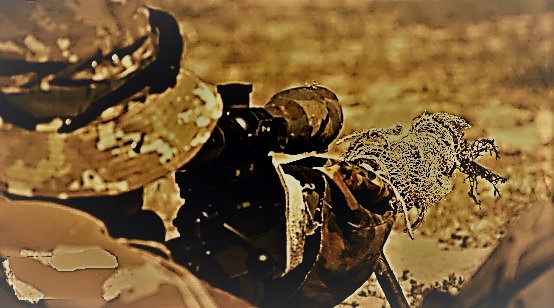
Nov 11, 2022 | The Blog
Today, the southern Ukrainian city of Kherson was liberated by the armed forces of Ukraine. Kherson was the only administrative center seized by Russia in the February 24 invasion and hastily annexed to the Russian Federation through a fraudulent process. This short story is dedicated to all Ukrainian fighters.
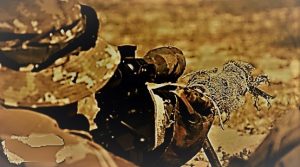 Hanna (callsign Vedma) is a 32-year-old sniper in the Ukrainian Army. Her unit is an assault infantry regiment currently deployed southwest of the town of Svatove, in the Luhansk Oblast of Ukraine. The Russian line is almost visible to the naked eye and the enemy is well dug in. Aerial reconnaissance shows the jagged shape of the Russian trenches forming the final defensive line before the outskirts of Svatove.
Hanna (callsign Vedma) is a 32-year-old sniper in the Ukrainian Army. Her unit is an assault infantry regiment currently deployed southwest of the town of Svatove, in the Luhansk Oblast of Ukraine. The Russian line is almost visible to the naked eye and the enemy is well dug in. Aerial reconnaissance shows the jagged shape of the Russian trenches forming the final defensive line before the outskirts of Svatove.
Despite their fortified position, the Russians are beginning to cave in all along the front in north-western Luhansk, under the impact of a well-timed Ukrainian offensive that swept eastward through the key towns of Izyum and Lyman in the neighboring Kharkiv Oblast. Intercepted radio traffic reveals that some enemy units are hastily retreating in the middle of the night, while others are left to their own devices after their officers just piled into staff cars and fled the frontline.
In the moonless night, Hanna has crawled to a well-concealed position slightly higher than the enemy trenches and is slowly getting ready for business. She wears several layers of technical clothing against the October chill and carries a thermos flask of hot tea. She’ll watch over the enemy line until the early morning and retire to her unit’s HQ before dawn. A blacked-out Toyota pickup will rendezvous with her on the far side of the woods she silently crossed to get here and deliver her and two more fellow snipers back to their lodgings.
Her sniper’s rifle is a Ukrainian-made Zbroyar Z-10, a brand-new weapon that fires the standard 7.52 NATO cartridge. Lying under a light camouflage net, both the weapon and the sniper are completely invisible to the enemy.
Vedma (which is Ukrainian for witch) methodically scans the Russian line, the Z-10’s butt nestled in her shoulder and the suppressed barrel resting on its bipod. The thermal imaging sight set atop the barrel shows her a blurred black band of frosty no-man’s land leading to the uneven outline of the trenches some 300 meters away. Beyond that she sees the fuzzy backdrop of a gray treeline and a slightly paler sky above.
After over an hour of uneventful scanning, two white blobs suddenly show in her sights, betraying the presence of at least two living bodies. Hanna calmly registers their sudden appearance and tries to make sense of their movements. They seem to be hunched over something or someone which they struggle to tug away from their dugout. The object of their exertions, however, does not return the heat signature that a wounded comrade would. Is that a dead body they’re dragging or maybe an ammo crate? Hanna invests a split second to process this as her index finger tightens on the trigger, the crosshairs steady on the left Russian’s center mass.
No matter what (or whom) they’re dragging—she concludes—they are all legit targets.
Three rapid shots ring out and shatter the silence of the night.
Now the thermal sights no longer return a target. The white blobs have dropped behind the raised far edges of the trench and can no longer be seen.
Hanna expertly gathers all her gear and scuttles to another position, but the rest of her shift will be uneventful. During her bumpy ride back to HQ she still puzzles over her earlier action but finds no answer.
The next morning, a reconnaissance drone solves the riddle. Following Vedma’s directions, the drone operator slowly flies the bird over the section of the Russian trenches the sniper was observing during the night and now hovers vertically above a bizarre sight.
Two dead Russian soldiers are sprawled on the ground and between them lies a dazzling white box, the washing machine they had looted in Svatove, its glass door facing the sky like a monocled eye—with a neat bullet hole almost dead center.
The drone operator, a skinny 20-year-old with a fuzzy reddish beard, looks at Hanna in awe and mumbles: “No more heavy-duty cycles for these two mobiks*.”
(*) “Mobik” is Ukrainian slang for any Russian mobilized soldier.
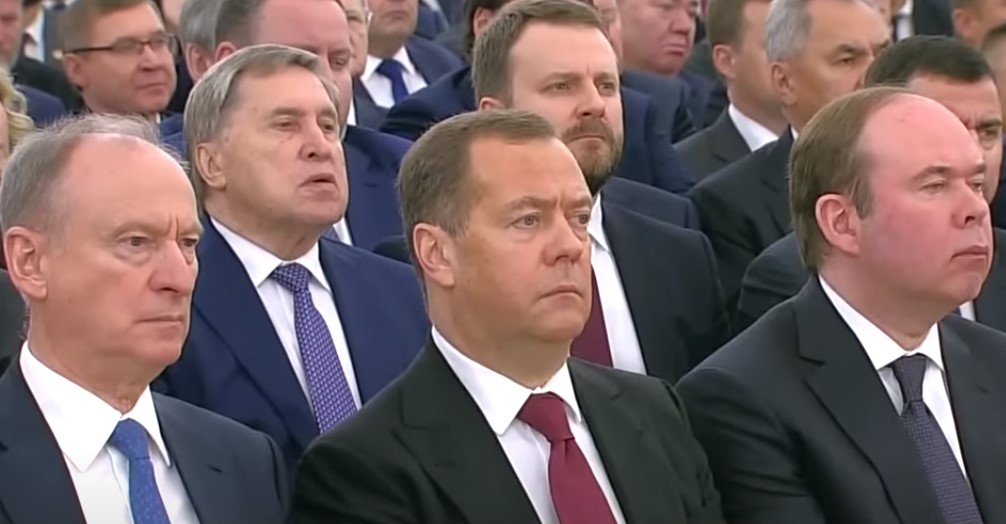
Nov 5, 2022 | The Blog
 About 90 years ago, a German theologian by the name of Dietrich Bonhoeffer took a firm stand against the Nazi party and that section of Germany’s religious establishment (the so-called German Christians) who supported the ideology of National Socialism.
About 90 years ago, a German theologian by the name of Dietrich Bonhoeffer took a firm stand against the Nazi party and that section of Germany’s religious establishment (the so-called German Christians) who supported the ideology of National Socialism.
Boenhoffer had warned against the danger of the leader (Führer in German) gradually becoming the Verführer (which in English can translate as seducer as well as misleader.)
His firm convictions and unequivocal opposition to the Austrian-born dictator saw Boenhoffer join the ranks of a secretive cabal that ultimately plotted the assassination attempts on the Führer. Imprisoned in the Flossenbürg concentration camp, Boenhoffer was promptly found guilty by a kangaroo court and hanged on April 9, 1945. Three weeks later, the Misleader-in-Chief committed suicide in his bunker, thus ending the war in Europe.
This sinister, disastrous drift from head of state to seducer/misleader of his people has also affected Vladimir Putin, and—by consequence—Russia as a whole.
In order to justify his second invasion of Ukraine in February 2022, Putin convinced a gullible, propaganda-addled populace that this so-called “special military operation” was aimed at the “denazification and demilitarization” of the neighboring sovereign country.
But the Russian dictator himself had been misled by his generals and surrogates, and while he was busy looking for the right suit to wear at the victory parade in Kyiv the following week, his army was bogged down and unable to seize its ultimate goal.
Fast-forward seven months or so. With the Russian military operations dragging on and the losses in blood and treasure piling up, Putin finally pulled the trigger on a nationwide “partial mobilization”. Not even a consummate deceiver as Vladimir Vladimirovich could soft-sell this to his fawning population. This was a bridge too far and the “denazification” battle cry had run out of steam.
So the regime—through its propagandists, spokespersons and the Man himself—decided to shift their nonsensical rhetoric into overdrive.
During a rambling speech in late September*, Putin told the world that the war was really a crusade against Western values and debauchery, with emphatic verbal attacks on junkies and homosexuals, Anglo-Saxon dogs of war and, unsurprisingly, satanist cults. It was a bizarre speech and, when the camera panned over the Kremlin audience, most faces were stony and unresponsive (see photo).
Later, encouraged by his boss’s recent rants, Russian ambassador to the UN Vasiliy Nebenzya denounced the West’s attempts to: (a) develop pathogens engineered to attack Slavic people, (b) infect migratory birds for spreading diseases within the Russian Federation, and (c) breed Covid-positive bats and disease-ridden mosquitoes to be secretly let loose on Russia. As for Ukraine, the ambassador accused it of working on a “dirty bomb” to be detonated as part of a false-flag operation. If all this does not earn Nebenzya the moniker “Dementia” nothing will.
Motivational speeches to Russian frontline troops have been promptly updated to contain the above verbiage. Chechen fraudster and Tik-Tok warrior Ramzan Kadyrov has already promised that his crowd will launch a jihad against all above enemies.
Russian political analyst and vlogger Maksim Katz ** was horrified at how low the official rhetoric had sunk “[This is] basically Al-Qaeda. A large, Northern Al-Qaeda spanning 11 time zones. How can they insult Russia like this?”
* The September 30, 2022 speech announced the sham annexation of Ukraine’s Luhansk, Donetsk, Kherson and Zaporizhzhia regions while the Ukrainian army was actively liberating them.
** On October 29, 2022 Maksim Katz was placed on the federal wanted list by the Russian Ministry of Internal Affairs.
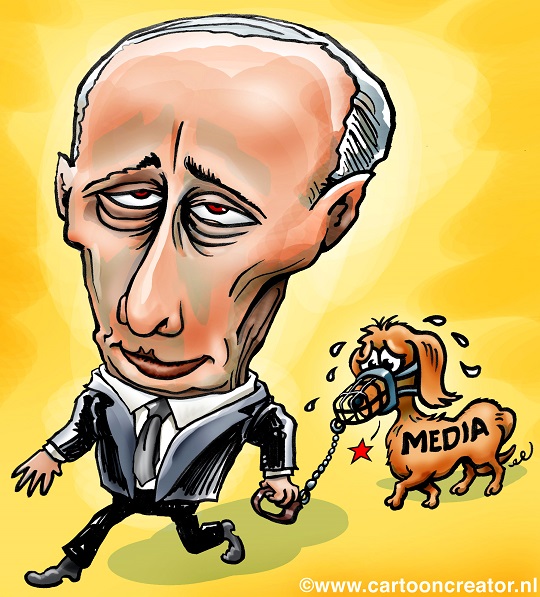
Ott 10, 2022 | The Blog
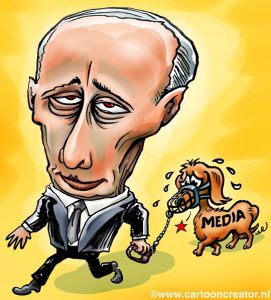
cartooncreator.nl
Mentre il conflitto in Ucraina vede la difesa russa sgretolarsi in più settori, da noi proseguono gli ululati dei sostenitori di una pace a tutti i costi. L’italiano medio è un emerito imbecille e perde il controllo delle proprie emozioni quando venga pronunciata la parola pace.
Ottenere la pace in un’Ucraina ancora occupata per il 15% dai russi può solo avvenire in due modi: vittoria sul campo delle truppe di Kyiv (con espulsione dei russi dal territorio ucraino) o un accordo che preveda la cessione alla Russia di parti del Paese invaso. Al momento, Kyiv non ha il minimo interesse a trattare visto che sta progressivamente eliminando gli invasori. Non ha nemmeno interesse a un cessate il fuoco temporaneo perché non farebbe altro che avvantaggiare il nemico.
Putin, invece, cerca di seminare incertezza nel campo avversario perché ottenere una pausa sul campo gli consentirebbe di riorganizzarsi e riprendere l’iniziativa.
Ma all’italiano medio non importano le conseguenze di un armistizio. Gli basta riempirsi la bocca della parola pace. A dire la verità, l’imbecille nostrano ti può elencare i vincitori delle ultime dieci edizioni del festival di Sanremo ma non ha idea di dove sia Kherson, chi sia Lukashenko, o quale sia l’attuale status della Crimea.
Sa solo che i combattenti ucraini del Battaglione Azov sono dei fascisti perché glielo ha detto la propaganda del nanetto nazista Putin.
A lui/lei basta appendere al balcone la bandiera arcobaleno con la scritta PACE, che gli è servita pure durante le fasi più drammatiche della pandemia, tanto al massimo non serve a niente.
Entra in scena Pietro Fassino (che nonostante le apparenze è ancora vivo) il quale declina all’Adnkronos il seguente obiettivo: «ottenere almeno un cessate il fuoco, patrocinato dall’Onu, consentirebbe nell’immediato di far tacere le armi e evitare ulteriori tragedie e sofferenze.»
Fassino è il presidente della Commissione Esteri della Camera e uno dei maggiori esponenti del PD. Ma se analizziamo le sue affermazioni, la Signora Lina (che fa la bidella alla scuola elementare all’angolo) avrebbe potuto esternarle con altrettanta competenza e lungimiranza.
Cui prodest? A chi serve oggi un cessate il fuoco?
Putin ha lanciato una caotica campagna di mobilizzazione “parziale” che si è arenata grazie alla proverbiale incompetenza e corruzione dell’apparato militare russo. Decine di migliaia di uomini sono stati rastrellati in tutta la Federazione Russa e scaraventati in direzione del fronte. Questi disgraziati non hanno ricevuto neppure un minimo addestramento, non hanno scarpe adatte, non hanno vettovaglie e vivono all’addiaccio o in sistemazioni di fortuna in attesa di essere mandati al macello.
Risultavano al computer dell’esercito russo 1,5 milioni di uniformi invernali, ma sono sparite. Come da lunga tradizione, il pagamento è stato fatto ma le uniformi non ci sono. Quali generali si sono spartiti il bottino (bonificando a Putin la sua giusta commissione) e hanno fatto sparire le prove?
Uno dei mezzibusti invitati a parlare in uno dei “talk show” della TV di stato russa, sosteneva giorni fa che l’esercito di Mosca avrebbe bisogno di un paio di mesi per potersi riorganizzare e riprendere a combattere in maniera più efficace. Ma come fare? Le truppe di Zelensky incalzano l’invasore e lo spingono a una rotta incontrollata nella regione di Kherson e nel Luhansk. Più accelera la controffensiva ucraina e più la resistenza russa si sgretola. Kyiv non cerca una tregua, vuole liberare il suo Paese.
Ed ecco che in più nazioni europee (e non) spuntano i Fassino a perorare la causa del cessate il fuoco, nascondendosi dietro al dito di “evitare ulteriori tragedie.”
Imbecilli o complici?

 I recently came across a lively Ukrainian pop song that sounded silly and innocent, a bit like the singer—a leggy blonde waif who looks like a Slavic Barbie doll.
I recently came across a lively Ukrainian pop song that sounded silly and innocent, a bit like the singer—a leggy blonde waif who looks like a Slavic Barbie doll.







